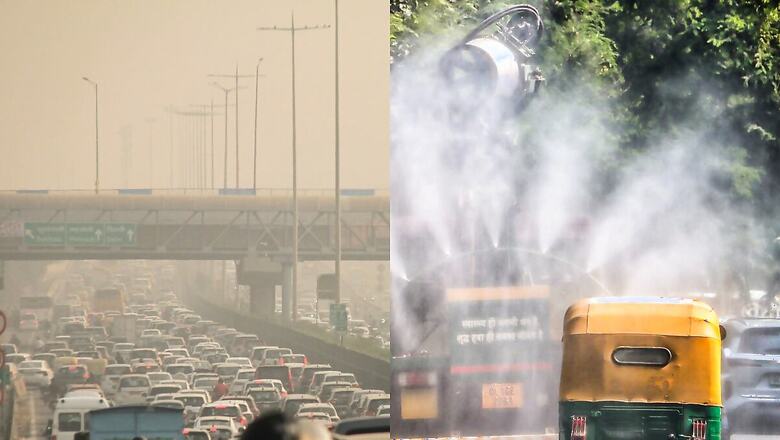
views
The Commission for Air Quality Management (CAQM) on Monday announced to invoke the second stage of Graded Response Action Plan (GRAP) across the national capital Delhi and its adjoining NCR region as the air quality of the region deteriorated to ‘Very Poor’ category. The restrictions would be imposed from 8 am on Tuesday, October 22.
According to CAQM, the air quality of the national capital was hovering around 300 on Monday. At round 4pm, it was recorded as 301.
“The Sub-Committee constituted for invoking actions under the GRAP in its meeting held on 21st October, 2024 comprehensively reviewed the air quality scenario in the region as well as the forecasts for meteorological conditions and air quality index of Delhi made available by IMD/IITM. The AQI of Delhi since morning has been hovering around 300 and at 4:00 P.M, t has been recorded as 410. Forecasts from IMD/IITM also indicate a likelihood of the AQI of Delhi to particularly remain in “VERY POOR” category (DELHI AQI 301- 4O0) in the coming days, owing to unfavourable meteorological & climatic conditions and calm winds,” the official statement said.
WHAT RESTRICTIONS WOULD BE THERE IN STAGE 2?
Under stage two of the GRAP, mechanical sweeping and water sprinkling on identified roads will be carried out on a daily basis, dust control measures will be enforced at construction and demolition sites, use of power generator sets will be discouraged and do’s and don’ts for minimising polluting activities will be issued in news media.
Further, traffic personnel will be deployed at congestion points, vehicle parking fees will be increased to discourage private transport and additional bus and metro services will be started.
The measures also involve increasing parking fees to discourage private transport and enhancing CNG or electric bus and metro services by introducing additional fleets and increasing service frequency. It also includes the use of public transport and minimize the use of personal vehicles.
People have been advised to use public transport, regularly replace air filters in automobiles and avoid dust-generating construction activities till January.
These measures will be in addition to the GRAP Stage 1 measures that have been in effect since October 15.
The Stage I of GRAP focuses on controlling pollution through dust mitigation at construction sites, proper waste management, and regular road cleaning. It mandates strict checks on polluting vehicles, better traffic management, and emission controls in industries, power plants, and brick kilns. The first stage also bans open burning of waste, limits the use of diesel generators, and prohibits the use of coal or firewood in eateries.
WHAT IS A GRADED RESPONSE ACTION PLAN?
The Graded Response Action Plan (GRAP) is a set of anti-air pollution measures, generally implemented in Delhi-NCR during the winter. Under GRAP, the government introduces several measures including strict restrictions on the plying of obsolete vehicles and a ban on the use of coal and firewood in eateries, restaurants and hotels when the AQI breaches the 200-mark.
If the AQI crosses the 400-mark, BS-III petrol and BS-IV diesel four-wheelers shall be immediately banned in Delhi and Gurugram, Faridabad, Ghaziabad and Noida.
GRAP is divided into four stages based on air quality: Stage I – ’Poor’ (AQI 201-300); Stage II – ’Very Poor’ (AQI 301-400); Stage III – ’Severe’ (AQI 401-450); and Stage IV – ’Severe Plus’ (AQI >450).















Comments
0 comment